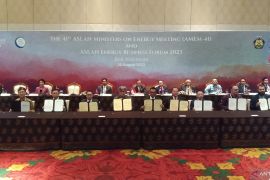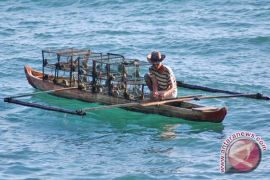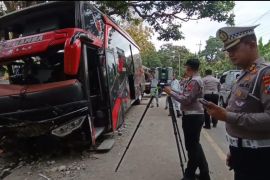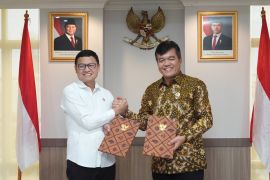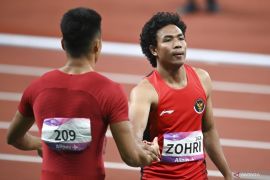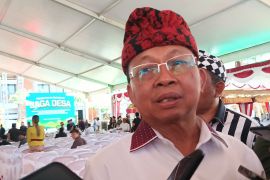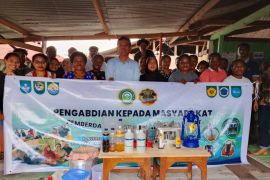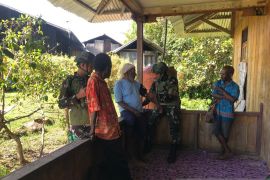Furthermore, Sharif said for 2011, 19 Indonesian fishermen vessel which sized less than 10 gross tonage (GT) caught by the government of Malaysia. From total of these vessels, 52 from 93 fishermen who had caught was succesfully freed through the advocate by Minister of Marine Affairs and Fisheries (KKP). By signing the Memorandum of Understanding, Sharif expect the fishermen who are still in Malaysia will be soon released and similar moment will not occured again in the future.
In this Memorandum of Understanding, both countries agree to release the traditional fishermen - sized less than 10 GT - whose lost in waters of both countries. In addition, this problem will be solved through diplomacy and negotiations by upholding the principle of equality and respectful in order to avoid unnecessary misunderstanding between two countries. Both countries are trying to respect the traditional fishing rights in UNCLOS 1982. "This two countries are committed to zero conflict," said Chief Executive Maritime Security Coordination Agency (Bakorkamla), Vice Admiral Didik Heru Purnomo.
Indonesia wants to solve this fishermen issue peacefully through this memorandum of understanding. The guidelines which come from the agreement between Minister of Foreign Affairs of Indonesia and Malaysia on October 20, 2011 in Lombok. Then it is reinforced by a meeting between the President of Indonesia Susilo Bambang Yudhoyono and Malaysian Prime Minister Najib Razak in the ASEAN summit last year in Bali.
Both country's leaders stated that the overcoming in Malaka Strait and South China Sea as well as part of Makassar Strait is aimed for community and not conflict. Indonesia and Malaysian patrols are reminding to each other that there will be no armed conflict. The signing of MoU is the mandate from two leaders between Indonesia and Malaysia. "The implementation of memorandum of understanding is if there were some fishermen who come into the territory of other countries whether from Malaysia and Indonesia in border area, such as Malaka Strait, South China Sea and near Ambalat, "said Didik.
Both countries agreed to assist the traditional vessels that are lost to return to waters of their respective countries and do not catch and make punishment to the traditional fishermen, except for vessels which conduct illegal fishing and use explosive and chemical materials . So if the Indonesian fishermen come into Malaysia were not arrested, but will be expelled to return to Indonesia and vice versa, so there will be no conflict," Sharif added.
The Ministry of Marine Affairs and Fisheries categorized the traditional fishermen as the fishermen who use boats with a weight of 5 to 10 GT. The signing of a memorandum of understanding was represented by Chief Executive Maritime Security Coordination Agency (Bakorkamla), Vice Admiral Y Didik Heru Purnomo from Indonesia, while Malaysia was represented by the Secretary of National Security Board Datuk Abdul Wahab Mohamed Thajudeen, and witnessed by Indonesian Coordinating Minister for Politics, Law, and Security, Joko Suyanto and Malaysian Senior Minister for Judicial Review, Datuk Seri Nazri Muhamed Bin Abdul Aziz.
Both countries intend to establish general guidelines to respect maritime regulation in each country. Previously, Bakorkamla with Malaysia State Safety Council has implemented a series of meeting between two countries including on last November 30, 2011 in Jakarta and last meeting on January 7, 2012 in Kuala Lumpur.
Both parties have succesfully agreed a draft of command dateline (Main principles) and main issues in the guidelines including priority to build good relationship, close cooperation and mutual understanding between two countries, every action based on maritime regulations of each country should avoid violence.
Moreover, both countries agreed in an effort to control, evaluate and review the necessary presence of maritime law enforcement agencies in ocean, such as the Maritime Security Coordinating Board (IMSCB / Bakorkamla) and Indonesian Navy Armed Forces, National Police, Ministry of Marine Affairs and Fisheries, Ministry of Transportation, from the side of Indonesia and Malaysia including Malaysian Maritime Enforcement Agency (MMEA), Malaysian Royal Navy, Malaysian Royal Air Force, Malaysian Royal Police, the Department of Fisheries and Malaysian Royal Custom.
For further information, please contact Dr. Yulistyo Mudho, M.Sc, Head of Data, Statistics and Information Center, the Ministry of Marine Affairs and Fisheries (Mobile: 0811836967)
Reporter: Oktavia
Editor: PR Wire
Copyright © ANTARA 2012
